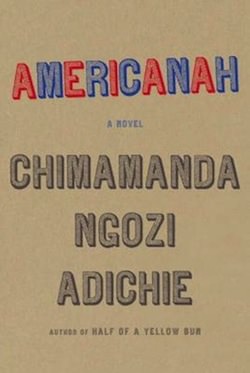Americanah
Chimamanda Ngozi Adichie's third novel compares racial hierarchies in the U.S. to social striving in her native Nigeria, with a ruthless honesty about the ugly and beautiful sides of both nations.
“Americanah” A book by Chimamanda Ngozi Adichie
What’s as American as the invention of race? Self-invention.
So we are reminded by Chimamanda Ngozi Adichie’s engaging third novel, “Americanah.” Having spent a good chunk of time living in America as an adult and being a hawkeyed observer of manners and distinctions in class, Adichie is uniquely positioned to compare racial hierarchies in the United States to social striving in her native Nigeria. She does so in this new work with a ruthless honesty about the ugly and beautiful sides of both nations.
“Americanah” is social satire masquerading as romantic comedy. There is mocking, but not without love. Her lovers, Ifemelu and Obinze, fall for each other in secondary school, go off to university together secure, but then part ways when crippling strikes threaten their education in Nigeria. Obinze packs up for London, where he works cleaning toilets under a false name, squirreling away enough cash to make a bid at a sham marriage he hopes will gain him citizenship. Ifemelu sets off for the United States with a partial scholarship to a school in Philadelphia, where she struggles to find a job and must stoop, at her lowest moment, to prostitution.
Obinze and Ifemelu led lives of relative privilege in Nigeria. They haven’t emigrated out of desperation, but rather from “the need to escape from the oppressive lethargy of choicelessness.” Their plan is to come back together after making something of themselves. Needless to say, things do not go according to plan.
Adichie is adept at describing her characters’ descent in dignity for the gambit of upward mobility. Obinze’s attempt to live in England is cursed. In one of the book’s most affecting scenes, he’s captured and deported, or, as his lawyer’s form states, “removed” like an object. Back in Nigeria, he finds a lucrative job in real estate through obsequious, shady transactions and marries a beautiful woman who bores him.
But Ifemelu’s story is this novel’s heart; she’s the brash and ambitious “Americanah” of its title. When we first meet her, she’s getting her hair braided at an African salon in Trenton, N.J., 13 years after coming to America. Her accomplishments include a prestigious fellowship at Princeton, a relationship with an earnest African-American professor named Blaine, and a popular blog about race with the antique-sounding title “Raceteenth or Various Observations About American Blacks (Those Formerly Known as Negroes) by a Non-American Black.” Yet she’s just decided to throw it all away and return home. From her chair at the hair salon, the book unfolds in a series of extended flashbacks that show Ifemelu drifting steadily upward through jobs, men, cities and hairstyles on her path to adulthood.
|
To see long excerpts from “Americanah” at Google Books, click here. |
Ifemelu’s journey in America is informed by experiences of race that won’t seem new to black Americans, though they’re new to her. As an African, and more specifically, as a Nigerian Igbo, she’s not “black” until she comes here. Blaine accuses her of not being “sufficiently furious because she was African, not African-American,” and Ifemelu sometimes worries that her blog is only “a mild satire about a world that was anything but mild.” Race entraps, beguiles and bewilders her because it’s an imaginary construct with actual consequences. She discovers she’ll be more employable, for example, when she chemically relaxes her hair to get that white-girl “swish.” Ifemelu’s blog entries about such discoveries plot her growth as a writer.
But beyond race, the book is about the immigrant’s quest: self-invention, which is the American subject. “Americanah” is unique among the booming canon of immigrant literature of the last generation (including writers Junot Diaz, Jhumpa Lahiri, Gary Shteyngart, Chang-rae Lee, Dinaw Mengestu and Susan Choi). Its ultimate concern isn’t the challenge of becoming American or the hyphenation that requires, but the challenge of going back home.
Ifemelu’s hairdresser wants to know why anyone would choose to return to the Third World. Ifemelu’s heartsickness for Obinze and her homesickness for Nigeria are two sides of the same coin. There’s a perfect Portuguese word for such currency: “saudade.” This feeling of longing gives a rich patina to the book’s finest section — its last. There, Ifemelu makes her return home, changed by all she has seen and done in the United States, and Adichie’s talent for description takes flight. Ifemelu has become her most authentic self, “a person who has learned to admire exposed wooden rafters,” well aware of her own haughtiness. Uneasy in a club of other “Nigerpolitan” returnees who pine for paninis and good customer service, she’s the quintessential outsider — or in other words, an artist. In America she was black. Back in Nigeria, she’s an Americanah.
Emily Raboteau is the author, most recently, of “Searching for Zion: The Quest for Home in the African Diaspora.”
©2013, Washington Post Book World Service/Washington Post Writers Group
Your support matters…Independent journalism is under threat and overshadowed by heavily funded mainstream media.
You can help level the playing field. Become a member.
Your tax-deductible contribution keeps us digging beneath the headlines to give you thought-provoking, investigative reporting and analysis that unearths what's really happening- without compromise.
Give today to support our courageous, independent journalists.









You need to be a supporter to comment.
There are currently no responses to this article.
Be the first to respond.